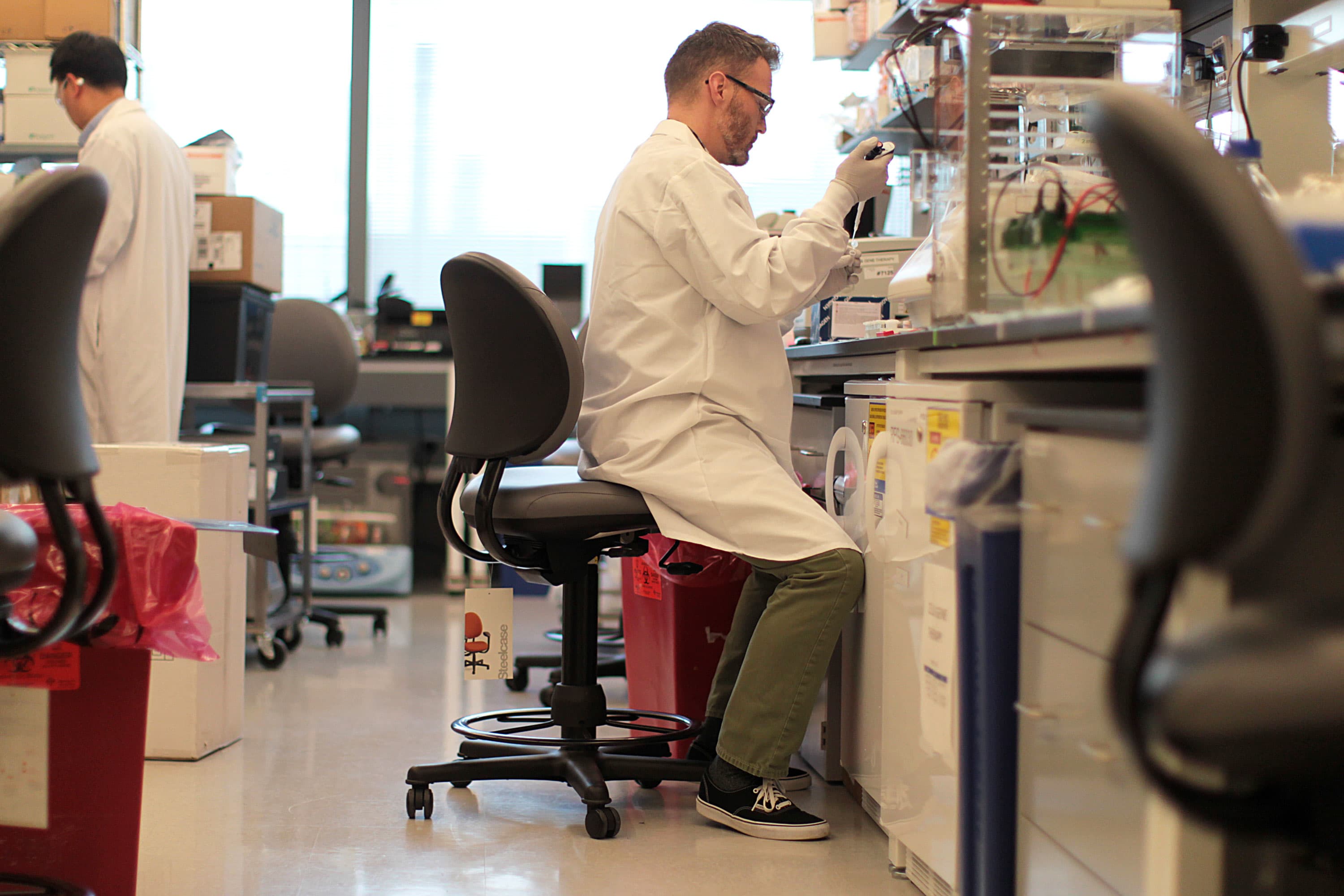A scientist works in a lab at Biogen in Cambridge, MA on Nov. 5, 2016.
Suzanne Kreiter | Boston Globe | Getty Images
Biogen pleased shareholders this week after it presented more data on its late-stage Alzheimer’s drug, aducanumab.
Shares of the biotech firm closed up 3.41% on Thursday as analysts pointed to a lack of any new negatives compared with the aducanumab results released in October, which may increase the drug’s odds of approval with the Food and Drug Administration.
The Cambridge, Massachusetts-based company still faces an uphill battle with the federal regulator, however.
The data, presented at the Clinical Trials on Alzheimer’s Disease conference in San Diego, were somewhat mixed, analysts noted. One of two late-stage trials from Biogen showed that aducanumab appeared to meet its goal of reducing decline in patients, while the other trial did not. To alleviate any concerns that the results were a fluke, the FDA could ask Biogen to do an additional trial before considering approval instead of postmarket, analysts say.
“It’s a complete coin flip that will now be in the hands of the FDA,” said Jared Holz, a health-care strategist at Jefferies, who put the chances of regulatory approval at 60%.
Public pressure on regulators
The FDA will be under immense pressure from advocacy groups, patients and families living with the disease to approve the drug when Biogen submits it to regulators, likely in early 2020.
The Alzheimer’s Association estimates 5.8 million Americans are living with the disease. There are currently no drugs approved by the FDA that can reverse the mental decline from Alzheimer’s, which is the sixth leading cause of death in the U.S. The FDA has approved Alzheimer’s drugs aimed at helping symptoms, not actually reversing or slowing the disease itself. Approval of the drug would likely spark excitement.
But public pressure alone may not be enough for Biogen’s drug to get approved, one analyst said.
“It’s a slippery slope for the FDA to approve this,” said Salim Syed, a senior biotech analyst at Mizuho Securities who is skeptical of Biogen’s newly released data. “The implications here are pretty large.”
Aducanumab targets a “sticky” compound in the brain known as beta-amyloid, which is hypothesized to play a role in the devastating disease. More research is needed on the compound, and not all scientists are convinced that beta-amyloid is the primary cause of Alzheimer’s. Many clinical trials targeting the compound have ended in failure.
If the FDA approves aducanumab, without more data, it has “essentially validated [the beta-amyloid] hypothesis,” Syed argued.
The FDA pushes back
The FDA has also appeared more willing to push back against drugmakers when substantial evidence of a drug’s benefit is in question, Syed noted.
In August, the FDA rejected Sarepta Therapeutics’ marketing application for a drug that aimed to treat children with Duchenne muscular dystrophy after the regulator was reportedly unconvinced about the drug’s benefit. The FDA also threatened to take action against Novartis this year after it was discovered the drugmaker concealed manipulated data.
The FDA “is taking a hard line now,” Syed said.
However, Scott Gottlieb, former commissioner of the FDA, said he wouldn’t try to look at the FDA’s previous actions to gauge Biogen’s chances of approval.
“FDA decision-making tends to be very drug- and application-specific,” he told CNBC. “I think people are wrong when they try to extrapolate from one drug to the next and assume that there’s some broader influence.”
Nevertheless, some analysts are skeptical about aducanumab’s benefits, after Biogen’s reversal on seeking regulatory approval of the drug earlier this year.
In March, Biogen pulled the plug on the Alzheimer’s drug after an analysis from an independent group revealed the medicine was unlikely to work. However, the company shocked investors in late October by announcing it was seeking regulatory approval for the drug after all.
Biogen scientists said at the time that a new analysis of a larger data set showed that aducanumab “reduced clinical decline in patients with early Alzheimer’s disease.” Some analysts weren’t convinced even as Biogen’s stock price recovered from the losses it suffered earlier in the year.
Biogen is confident
Despite the skepticism, Biogen is optimistic.
Biogen CEO Michel Vounatsos told CNBC in October that he is “reasonably confident” the FDA will approve the Alzheimer’s drug. Vounatsos insisted that Biogen’s dosing of the drug previously just wasn’t high enough. “The road to breakthrough innovation is full of twists and turns,” he added. “We started to have some hope.”
“We worked in full transparency with the regulator,” Vounatsos said, emphasizing that the FDA has all of the company’s data on the drug.
Experts discussing the results on a panel at the CTAD conference Thursday were also largely positive about the merits of Biogen’s drug.
Sharon Cohen, a primary investigator on Biogen’s trial, said the data is “exhilarating not just to the scientific community but to our patients as well.”
